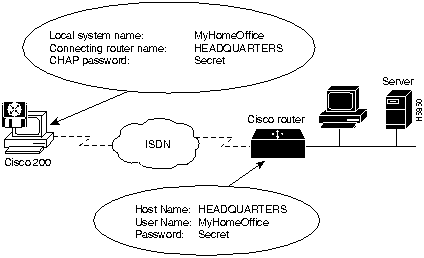|
|
Connecting Routers and the Cisco 200
The Cisco 200 for DOS, Windows 3.1, and Windows for Workgroups 3.11 can communicate with any Cisco router that supports ISDN. This appendix provides guidelines for configuring the connecting router and sample configurations.
Before you install and configure your Cisco 200, you should verify that the connecting router is properly installed and configured. For more information on router installation and configuration, refer to the Cisco Connection Documentation CD-ROMs or the printed Cisco router documentation.
The following are general guidelines for configuring Cisco routers to communicate with the Cisco 200:
Figure A-1 illustrates the authentication configuration for the connecting router.
Figure A-1 : Connecting Router Authentication Configuration

The following sections provide sample configurations for a Cisco 2503 router. The configurations of other Cisco Access and Cisco Enterprise routers will be similar.
The following example illustrates a connecting router configuration using PPP multilink with PPP callback and the NI1 ISDN protocol:
Configuration for Central Site (2503) ! version 11.0 ! hostname HEADQUARTERS !The name of the connecting router ! username MyHomeOffice password 7 044F0E151B !The Cisco 200 local system name ipx routing 0000.0c07.ad01 isdn switch-type basic-ni1 ! interface Ethernet0 ip address 192.168.100.1 255.255.255.0 no keepalive ipx network 50 ! interface BRI0 ip address 192.168.200.2 255.255.255.0 encapsulation ppp no ip route-cache no keepalive ipx network 22 no ipx route-cache ipx watchdog-spoof isdn spid1 4085553000100 5553000 !SPID and Directory; required for NI1. isdn spid2 4085553001200 5553001 !Second SPID and Directory; required for NI1. no peer default ip address pool dialer enable-timeout 2 dialer map ip 198.162.200.3 name MyHomeOffice class HOMEOFFICE 7145551111 dialer map ipx 22.0001.2345.6789 name MyHomeOffice class HOMEOFFICE 7145551111 dialer-group 1 no fair-queue !Required for PPP multilink ppp callback accept !Required for PPP callback ppp multilink !Required for PPP multilink ppp authentication chap !Required for CHAP authentication ! router rip network 192.168.100.0 network 192.168.200.0 ! map-class dialer HOMEOFFICE !Required for PPP callback dialer callback-server username !Required for PPP callback ! dialer-list 1 protocol ip permit dialer-list 1 protocol ipx permit
Cisco 2503 Using 5ESS (Point-to-Point or Multipoint)
The following example illustrates a connecting router configuration using the PPP multilink with PPP callback and 5ESS Point-to-Point Protocol (PPP) or Multipoint Protocol:
Configuration for Central Site (2503) ! version 11.0 ! hostname HEADQUARTERS !The name of the connecting router ! username MyHomeOffice password 7 044F0E151B !The Cisco 200 local system name ipx routing 0000.0c38.67bc isdn switch-type basic-5ess ! interface Ethernet0 ip address 192.168.100.1 255.255.255.0 no keepalive ipx network 50 ! interface BRI0 ip address 192.168.200.2 255.255.255.0 encapsulation ppp no ip route-cache no keepalive ipx network 22 no ipx route-cache ipx watchdog-spoof isdn spid1 0155530000 !SPID might be required for 5ESS no peer default ip address pool !The following three lines are required for PPP callback dialer enable-timeout 2 dialer map ip 192.168.200.3 name MyHomeOffice class HOMEOFFICE 17145551111 dialer map ipx 22.0001.2345.6789 name MyHomeOffice class HOMEOFFICE 17145551111 ! dialer-group 1 no fair-queue !Required for PPP multilink ppp callback accept !Required for PPP callback ppp multilink !Required for PPP multilink ppp authentication chap !Required for CHAP authentication ! router rip network 192.168.100.0 network 192.168.200.0 ! map-class dialer HOMEOFFICE !Required for PPP callback dialer callback-server username !Required for PPP callback ! dialer-list 1 protocol ip permit dialer-list 1 protocol ipx permit
The following example illustrates a connecting router configuration using PPP multilink with PPP callback and the DSS1 Protocol:
! version 11.0 ! hostname HEADQUARTERS !The name of the connecting router ! username MyHomeOffice password 7 044F0E151B !The Cisco 200 local system name ipx routing 0000.0c07.ad01 isdn switch-type basic-net3 isdn tei-negotiation first-call ! interface Ethernet0 ip address 192.168.100.1 255.255.255.0 no keepalive ipx network 50 ! interface BRI0 ip address 192.168.200.2 255.255.255.0 encapsulation ppp no ip route-cache no keepalive ipx network 22 no ipx route-cache ipx watchdog-spoof !No SPID or Directory required for DSS1 no peer default ip address pool !The following three lines are required for PPP callback dialer enable-timeout 2 dialer map ip 192.168.200.3 name MyHomeOffice class HOMEOFFICE 49235551111 dialer map ipx 22.0001.2345.6789 name MyHomeOffice class HOMEOFFICE 49235551111 ! dialer-group 1 no fair-queue !Required for PPP multilink ppp callback accept !Required for PPP callback ppp multilink !Required for PPP multilink ppp authentication chap !Required for CHAP authentication ! router rip network 192.168.100.0 network 192.168.200.0 ! map-class dialer HOMEOFFICE !Required for PPP callback dialer callback-server username !Required for PPP callback ! dialer-list 1 protocol ip permit dialer-list 1 protocol ipx permit
Refer to your router manufacturer's documentation for instructions on communicating with other PPP-compliant routers.
|
|
Copyright 1988-1996 © Cisco Systems Inc.